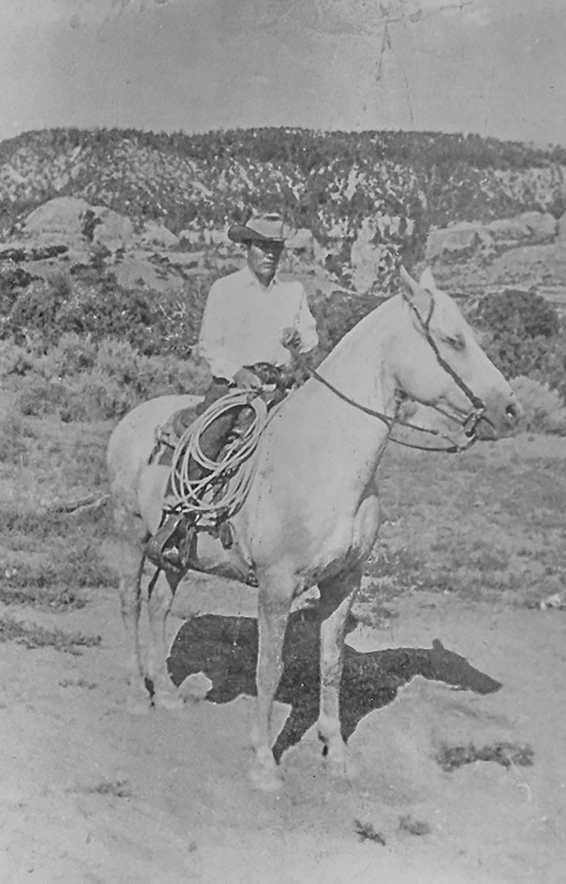
Courtesy | Kinsel family archive Navajo Code Talker John Kinsel Sr. rides his rodeo horse, “Yo-yo,” a gift from a cousin.
Posted on 10/20/2024 8:32:48 AM PDT by DFG
Peter MacDonald and Thomas Begay are the only 2 Navajo Code Talkers still alive.
RIP.
Rest In Peace, John.
RIP and thank you for your service.🙏🙏🙏🙏
Guadalcanal, Tarawa, Peleliu, Iwo Jima: the Navajo code talkers took part in every assault the U.S. Marines conducted in the Pacific from 1942 to 1945. They served in all six Marine divisions, Marine Raider battalions and Marine parachute units, transmitting messages by telephone and radio in their native language a code that the Japanese never broke.
The idea to use Navajo for secure communications came from Philip Johnston, the son of a missionary to the Navajos and one of the few non-Navajos who spoke their language fluently. Johnston, reared on the Navajo reservation, was a World War I veteran who knew of the military’s search for a code that would withstand all attempts to decipher it. He also knew that Native American languages notably Choctaw had been used in World War I to encode messages.
Johnston believed Navajo answered the military requirement for an undecipherable code because Navajo is an unwritten language of extreme complexity. Its syntax and tonal qualities, not to mention dialects, make it unintelligible to anyone without extensive exposure and training. It has no alphabet or symbols, and is spoken only on the Navajo lands of the American Southwest. One estimate indicates that less than 30 non-Navajos, none of them Japanese, could understand the language at the outbreak of World War II.
....................
Praise for their skill, speed and accuracy accrued throughout the war. At Iwo Jima, Major Howard Connor, 5th Marine Division signal officer, declared, “Were it not for the Navajos, the Marines would never have taken Iwo Jima.” Connor had six Navajo code talkers working around the clock during the first two days of the battle. Those six sent and received over 800 messages, all without error.
.....................................
Navajo remained potentially valuable as code even after the war. For that reason, the code talkers, whose skill and courage saved both American lives and military engagements, only recently earned recognition from the Government and the public.
RIP sir and thank you.
IMO-—THE NAVAJO CODE TALKERS were just a notch or 2 ABOVE the EXPLODING PAGERS & WALKIE TALKIES IN ISRAEL.
I often wonder HOW MANY AMERICANS ACTUALLY UNDERSTOOD WHAT THEY DID???
Rest in peace.
His life is a good reminder that there are pillars of the community and patriots in many places in America. Our country is blessed to have a deep bench of good people. It’s easy to lose sight of that.

Courtesy | Kinsel family archive Navajo Code Talker John Kinsel Sr. rides his rodeo horse, “Yo-yo,” a gift from a cousin.
There was a film describing the exploits of the talkers...worth a watching.
Good job John. Your life was consequential and you accomplished more than most could ever hope to accomplish. Go with God, your rewards await.
Thanks to him for his service. RIP
Lukachukai had, and perhaps still has, one of the most authentic trading posts on the Navajo Res. It is really in an out of the way part of that vast territory. Where a Navajo could live out his final years in peace. RIP code-talker. RIP.
RIP, sir.
RIP SIR.
If the gov never disclosed what the Navajo did during the War, would it still be an unbreakable code?
The Army originated using Indian code talkers in WWI and was using them in all theaters, the Pacific, Africa, and Europe in WWII, the concept was well know and used different tribes.
“The name code talkers is strongly associated with bilingual Navajo speakers specially recruited during World War II by the Marines to serve in their standard communications units in the Pacific Theater. Code talking, however, was pioneered by Choctaw Indians serving in the U.S. Army during World War I. These soldiers are referred to as Choctaw code talkers.
Other Native American code talkers were deployed by the United States Army during World War II, including Cherokee, Choctaw, Lakota Meskwaki, and Comanche soldiers. Soldiers of Basque ancestry were used for code talking by the U.S. Marines during World War II in areas where other Basque speakers were not expected to be operating.”
RIP
RIP. 107, that’s a pretty good ride. And well earned.
Disclaimer: Opinions posted on Free Republic are those of the individual posters and do not necessarily represent the opinion of Free Republic or its management. All materials posted herein are protected by copyright law and the exemption for fair use of copyrighted works.